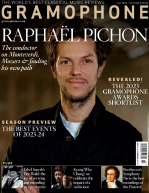Texte paru dans: / Appeared in: |
|
|
Outil de traduction |
|
|
In the penultimate instalment of their Machaut series, The Orlando Consort tackle a pinnacle of the composer’s output, the Lay de la fonteinne, a reflection on the Virgin Mary to whom Machaut speaks directly, at times in very direct language. The two earlier accounts are contrasted (though both include the incomparable Rogers Covey-Crump) in that the Hilliards opt for a church acoustic where the Medieval Ensemble of London choose a much drier one, which I feel suits the music better. And there is something else: when the music moves from monophony to polyphony, the Hilliards let each voice of the three-voice canon run to the end of the text, so that one is left with just one voice, whereas the Davies brothers stop when the first voice has reached the end (so that the polyphonic sections finish polyphonically). I cannot help thinking that this must be the right approach (not least because the last remaining voice doesn’t always finish on the final). The point needs spelling out because it seems crucial to the musical design, and because the Orlandos follow the Hilliards in this. They perform the piece at a lower pitch, and with more contrasted vocal timbres. Theirs are audibly older voices, too, admittedly lacking the pinpoint precision of the earlier accounts; in the monophonic sections the impression of fragility enhances the urgency of the poet’s singular utterance, as does the dryish acoustic.
In any case, the Orlandos bring to the table many years of experience of singing together. Elsewhere, much of the melodic argument is carried by the two younger singers, for example in the rondeaus Donnez, signeurs or Tant doucement, where Matthew Venner and Mark Dobell (respectively) savour Machaut’s sinuous lines. On this recording more than usually, one cannot help but be reminded of Gothic Voices under Christopher Page, because of the number of pieces that they had recorded previously. Although the comparison isn’t to the Orlandos’ advantage in terms of technique, I admire their deep commitment to Machaut’s art, which transcends these problems: the words are always delivered with real feeling (try En mon cuer), and one can hardly pass up the chance to hear the three late four-voice motets in close proximity. However many times one has heard it, the opening phrase of Christe qui lux still astonishes. At all times throughout this series, Machaut’s range is still astonishing. |
|




